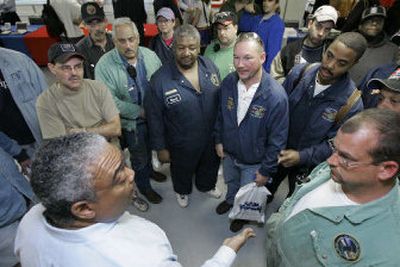Ford workers face day of decision

WAYNE, Mich. — Like many of his co-workers at a Ford truck plant near Detroit, Edward Woods is facing the dilemma of his life.
Does he take Ford up on one of its buyout offers and start a new career? Or does he stick with the job that’s fed his family for the past decade and run the risk of being laid off later?
It’s a quandary that is playing out at 75,000 kitchen tables nationwide as all Ford Motor Co. hourly workers consider a list of eight buyout or early retirement offers made for the sole purpose of persuading them to leave the company.
Ford is selling far fewer vehicles than it used to, and it doesn’t need as many plants or workers as it had in the past. In a historic agreement with the United Auto Workers union, the company agreed last month to offer the buyouts to all of its production workers.
For Woods and most others, the decision has to be made by Nov. 27. For 10,400 Ford workers stationed at former Visteon Corp. plants that the company plans to close or sell, the deadline was Friday.
Woods, 45, of Ypsilanti Township, is considering an offer that would give him up to $15,000 per year for four years of college tuition, plus half of his pay and health benefits for four years. There’s also an offer that pays 70 percent of his salary and tuition, both for two years.
He’s into computers and may go for an information technology degree. But then there’s those four kids and a mortgage.
“I know education would be worth it, but while I’m doing that process, bills still need to be paid, kids need to be fed,” he said while attending a company-sponsored job fair at his plant that included about 50 employers and colleges.
The buyout offers and Ford’s effort to shrink itself into competitiveness are forcing workers like Woods to look into the future and consider whether their plants will eventually be closed, leaving them with little or nothing.
Ford says it will shutter 16 plants, but it has yet to identify nine of them, keeping workers guessing. The company, which lost $1.4 billion in the first half of the year, hopes to cut 30,000 hourly jobs by the end of 2008 as part of its new “Way Forward” restructuring plan.
At the Michigan Truck plant in Wayne, nearly all the workers would like to stay on and keep a lifestyle that for a generation was at the top of America’s working class.
But the plant makes the Ford Expedition and Lincoln Navigator large sport utility vehicles, which haven’t been popular in an era of high gasoline prices. Through September, Ford sold 34.4 percent fewer Expeditions than in the first nine months of last year, while Navigator sales were off 18.7 percent.
“We’re making large vehicles that unfortunately eat a lot of gas,” said Russ Nesmith, 41, a 10-year worker from Livonia who’s considering a buyout.
Like other workers at the job fair who are too young to retire, Otis Sanders, 49, who has been with Ford 14 years, fears making a mistake by leaving a great job. The average Ford hourly worker in the U.S. earned about $65,800 last year, not including overtime and benefits.
“We don’t want to go and jump into something and wind up messing ourselves up,” he said after hearing a sales pitch from a recruiter for the Union Pacific Railroad, which has job openings that pay well and require skills comparable to an assembly line worker’s.
Sanders, of Westland, is considering an option that would pay him $100,000 to leave.
The railroad, which operates in 23 states mainly west of the Mississippi, drew the biggest crowd of workers at the Thursday afternoon job fair.
Recruiter Bill Blakney told the workers that 35 percent of the railroad’s employees are within 10 years of retirement, and Union Pacific plans to replace them by hiring 5,000 to 6,000 workers annually for the next 10 years.
Some older Ford workers asked Blakney if they would be too old for the engineer, conductor, mechanic, track maintenance or other jobs the company has open.
“They hire old guys,” Blakney said. “Here’s the thing. They don’t care about age. They care about work.”
The decision that the workers must make is one that even economists aren’t equipped to handle because it involves so many unknowns, said Gary Chaison, professor of labor relations at Clark University in Worcester, Mass.
“This is a type of decision that no one is prepared to make. There’s nothing in anyone’s training or anyone’s life that would prepare them for a decision like this,” Chaison said.
Nesmith already has applied for a railroad position in Idaho, where his wife also is seeking work.
He’s looking at the $100,000 offer, grateful that Ford at least gave him the chance to walk away with money in his pocket.
“They could have just said, ‘Bye, you’re laid off,”’ he said.
“When you’re on a sinking ship and somebody throws you a life jacket, you’d better take it.”